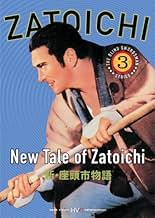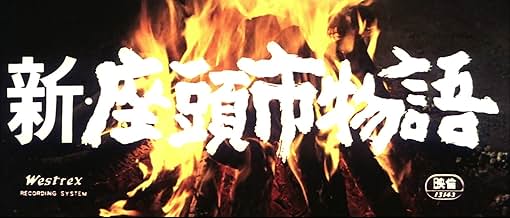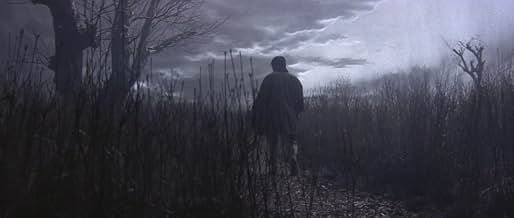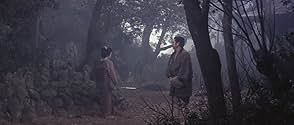AVALIAÇÃO DA IMDb
7,3/10
2,5 mil
SUA AVALIAÇÃO
Adicionar um enredo no seu idiomaWishing to find peace, Zatoichi travels to his old village but only finds trouble when he ends up in a love triangle and finds old scores have followed him home.Wishing to find peace, Zatoichi travels to his old village but only finds trouble when he ends up in a love triangle and finds old scores have followed him home.Wishing to find peace, Zatoichi travels to his old village but only finds trouble when he ends up in a love triangle and finds old scores have followed him home.
- Direção
- Roteiristas
- Artistas
- Prêmios
- 1 indicação no total
- Direção
- Roteiristas
- Elenco e equipe completos
- Produção, bilheteria e muito mais no IMDbPro
Avaliações em destaque
Daiei's logo is impressively shown for the first time in colour, in this, the third Zatoichi adventure, released only five months after the second film, and eleven months after the original.
Well photographed in full colour, it's another beautiful looking film, and the director, and cinematographer, both know how to effectively use bright, vivid colours, contrasted with subdued tones, as the second film's villain's brother tries to avenge his death, while Ichi is dealing with a ruthless gang of thugs, but I must admit that I did prefer the monochromatic photography of the first two installments.
Well photographed in full colour, it's another beautiful looking film, and the director, and cinematographer, both know how to effectively use bright, vivid colours, contrasted with subdued tones, as the second film's villain's brother tries to avenge his death, while Ichi is dealing with a ruthless gang of thugs, but I must admit that I did prefer the monochromatic photography of the first two installments.
I recently rewatched The New Tale of Zatoichi (1963) on a random streaming service. The storyline follows Zatoichi as he returns home seeking peace. However, he finds anything but-his hometown is threatened by a local mob, the brother of a man he killed is tracking him down, and two women fall in love with him. Can Zatoichi save himself and his townspeople from these challenges?
Directed by Tokuzô Tanaka (The Haunted Castle), the film stars Shintarô Katsu (*Hanzo the Razor), Mikiko Tsubouchi (Yokai Monsters: 100 Monsters), Seizaburô Kawazu (Yojimbo), and Fujio Suga (The Master Spearman).
Shintarô Katsu is fantastic in all of these movies, but it's especially fun to watch a younger depiction of his character. Zatoichi is an easy character to root for-always noble and righteous. I always hope he'll get the girl in the end, even when you know how things are likely to conclude. The female lead in this film is both compelling and complex, making her someone you can root for and against. The overall storyline is intricate, well-written, and a pleasure to watch unfold. The choreography is top-notch, with a thrilling opening fight at a bar, a dynamic battle when he first arrives in town, and a final samurai showdown that could go either way. There's a lot to appreciate here.
In conclusion, The New Tale of Zatoichi is another worthwhile entry in this series and an absolute must-see. I would score it a 7.5/10 and strongly recommend it.
Directed by Tokuzô Tanaka (The Haunted Castle), the film stars Shintarô Katsu (*Hanzo the Razor), Mikiko Tsubouchi (Yokai Monsters: 100 Monsters), Seizaburô Kawazu (Yojimbo), and Fujio Suga (The Master Spearman).
Shintarô Katsu is fantastic in all of these movies, but it's especially fun to watch a younger depiction of his character. Zatoichi is an easy character to root for-always noble and righteous. I always hope he'll get the girl in the end, even when you know how things are likely to conclude. The female lead in this film is both compelling and complex, making her someone you can root for and against. The overall storyline is intricate, well-written, and a pleasure to watch unfold. The choreography is top-notch, with a thrilling opening fight at a bar, a dynamic battle when he first arrives in town, and a final samurai showdown that could go either way. There's a lot to appreciate here.
In conclusion, The New Tale of Zatoichi is another worthwhile entry in this series and an absolute must-see. I would score it a 7.5/10 and strongly recommend it.
The following review is an extract from the book "Shintaro Katsu´s Zatoichi: Complete guide to all movies", which is now available on Amazon.
In this third part of the Zatoichi saga, the protagonist (played by Shintaro Katsu) wants to change some things of his past, leave behind the Yakuza and correct his mistakes, returning to the town where he grew up. On the way he meets a former schoolmate, who acts as a musician singing and playing the shamisen. His childhood friend is with his wife and young son. The four stay in an inn for the night, and as Ichi sings a song with the shamisen, the place is assaulted by a gang of hooded thieves. So as not to endanger his friends and other guests, Zatoichi does not resist for the time being, and prefers the criminals to believe that he is nothing more than a poor, blind masseur (when in reality he is a prodigious swordsman, even though he lacks a sense of vision).
(...)
The third part of the Zatoichi saga has a slight philosophical background that is somewhat reminiscent of Taoism (the action of non-doing, or wu-wei). Zatoichi's apparent passivity towards Kanbei's brother, who wants revenge, provokes new reactions and events. The attitude of the protagonist is to renounce his past life and become a new man by returning to the origins, to the village where he grew up. There he will discover with disappointment that the one who trained him in the arts of fencing, the one to whom he owes his knowledge in the handling of the sword, far from being a venerable master, is actually a despot who does not hesitate to mercilessly murder unarmed people and in inferior conditions, either as a consequence of his uncontrollable anger or simply for money and material goods, in cold blood. Much more noble and honorable is the young yakuza. After verifying this, Zatoichi decides to continue his wandering life, renounces family and marriage and continues on his way with the firm intention of never returning to his village.
In this third part of the Zatoichi saga, the protagonist (played by Shintaro Katsu) wants to change some things of his past, leave behind the Yakuza and correct his mistakes, returning to the town where he grew up. On the way he meets a former schoolmate, who acts as a musician singing and playing the shamisen. His childhood friend is with his wife and young son. The four stay in an inn for the night, and as Ichi sings a song with the shamisen, the place is assaulted by a gang of hooded thieves. So as not to endanger his friends and other guests, Zatoichi does not resist for the time being, and prefers the criminals to believe that he is nothing more than a poor, blind masseur (when in reality he is a prodigious swordsman, even though he lacks a sense of vision).
(...)
The third part of the Zatoichi saga has a slight philosophical background that is somewhat reminiscent of Taoism (the action of non-doing, or wu-wei). Zatoichi's apparent passivity towards Kanbei's brother, who wants revenge, provokes new reactions and events. The attitude of the protagonist is to renounce his past life and become a new man by returning to the origins, to the village where he grew up. There he will discover with disappointment that the one who trained him in the arts of fencing, the one to whom he owes his knowledge in the handling of the sword, far from being a venerable master, is actually a despot who does not hesitate to mercilessly murder unarmed people and in inferior conditions, either as a consequence of his uncontrollable anger or simply for money and material goods, in cold blood. Much more noble and honorable is the young yakuza. After verifying this, Zatoichi decides to continue his wandering life, renounces family and marriage and continues on his way with the firm intention of never returning to his village.
This is more boring and more predictable than the other Zatoichi movies I've seen so far. And, I only mean the ones with Shintarô Katsu, excluding the one
with Takeshi Kitano. However, it has some good moments, still worth seeing. Mikiko Tsubouchi is not as beautiful as the actresses in other Zatoichi movies,
but she has her own charm.
'New Tale Of Zatoichi (1963)' sees its eponymous blind swordsman/masseur return to the town in which he was trained, followed by his reputation and the repercussions of the prior movie's events. Once again, it's a relatively meditative character study at heart. With flashes of fast-paced, decisive action and a background plot focused on a kidnapping, the picture ebbs and flows until it reaches its melancholic yet explosive finale. It's a little bit scatterbrained and doesn't have the strongest of central threads; the closest thing to a proper through-line is probably an ill-fated romance that brings out the best in Zatoichi but the worst in his master. In general, the movie is enjoyable. Plus, its shift to colour has little impact on its overall look and feel. Even if it isn't as solid as its two predecessors, it's still well-made and engaging. 7/10
Você sabia?
- CuriosidadesThis is the first Zatoichi movie to be shot in colour.
- ConexõesFeatured in Best in Action: 1963 (2019)
Principais escolhas
Faça login para avaliar e ver a lista de recomendações personalizadas
- How long is New Tale of Zatoichi?Fornecido pela Alexa
Detalhes
- Data de lançamento
- País de origem
- Idioma
- Também conhecido como
- New Tale of Zatoichi
- Empresa de produção
- Consulte mais créditos da empresa na IMDbPro
- Tempo de duração
- 1 h 31 min(91 min)
- Proporção
- 2.35 : 1
Contribua para esta página
Sugerir uma alteração ou adicionar conteúdo ausente



























